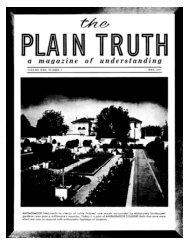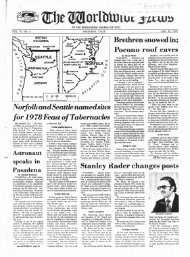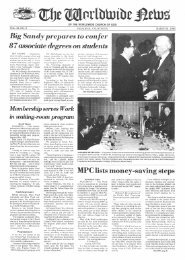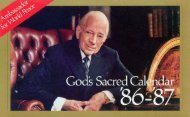The Biblical Basis of the Sacred Calendar Part One
The Biblical Basis of the Sacred Calendar Part One
The Biblical Basis of the Sacred Calendar Part One
Create successful ePaper yourself
Turn your PDF publications into a flip-book with our unique Google optimized e-Paper software.
eason for Postponement Rule 1. If <strong>the</strong> weekly Sabbath and <strong>the</strong> fall Holy Days (especially Atonement)<br />
could fall back-to-back, it would become much more difficult to keep any <strong>of</strong> <strong>the</strong>m as God intended, let<br />
alone to discern <strong>the</strong>ir true meaning. Rule 1 solves this problem, while keeping <strong>the</strong> lesser problems posed<br />
by Sabbath/Holy Day combinations in <strong>the</strong> spring to a bare minimum.<br />
So all four postponement rules have a basis in biblical principles (two <strong>of</strong> <strong>the</strong>m out <strong>of</strong> logical necessity).<br />
<strong>The</strong>y are judgments based on <strong>the</strong> letter and spirit <strong>of</strong> <strong>the</strong> "oracles <strong>of</strong> God". Three <strong>of</strong> <strong>the</strong> rules are also<br />
founded in practical calendar astronomy; and <strong>the</strong> fourth (Rule 1) is an act <strong>of</strong> mercy.45<br />
<strong>The</strong>se rules are also founded in <strong>the</strong> spiritual principle behind true Sabbath-keeping. As <strong>the</strong> Sabbath was<br />
made for man, not man for <strong>the</strong> Sabbath (Mark 2:27), so <strong>the</strong> sacred calendar and its Festivals were meant<br />
to serve man, not man <strong>the</strong> calendar and Festivals. <strong>The</strong> same principle applies to <strong>the</strong> astronomical cycles<br />
on which <strong>the</strong> sacred calendar is based (cf. Deuteronomy 4:19).<br />
<strong>The</strong>re are o<strong>the</strong>r principles that apply here as well. Would God have us serve <strong>the</strong> creation ra<strong>the</strong>r than <strong>the</strong><br />
Creator (Romans 1:25)? Would He have us walk by sight ra<strong>the</strong>r than faith (2 Corinthians 5:7)? Would He<br />
prefer a calendar that is not "done decently and in order" (1 Corinthians 15:40), or that leads to confusion<br />
ra<strong>the</strong>r than to peace (15:33)? Yet we are led to <strong>the</strong>se things, if we misunderstand <strong>the</strong> implications <strong>of</strong> what<br />
God reveals about how <strong>the</strong> calendar relates to <strong>the</strong> cycles He ordained in creation!<br />
Based on <strong>Biblical</strong> and Practical Principles<br />
So we have a biblical (and practical) principle behind <strong>the</strong> use <strong>of</strong> <strong>the</strong> molad ra<strong>the</strong>r than <strong>the</strong> new crescent to<br />
mark <strong>the</strong> "default position" <strong>of</strong> <strong>the</strong> "new moon". We have equally biblical (and practical) principles behind<br />
<strong>the</strong> 19-year cycle and its sequence <strong>of</strong> 12 common and 7 leap years. We have practical, biblical principles<br />
behind Postponement Rules 1 and 2, and by extension behind Rules 3 and 4 as well. Only <strong>the</strong> sabbatical<br />
and Jubilee years are ignored by our calendar; but <strong>the</strong>se are no longer observed in this age, not even by<br />
Rabbinic Judaism. (<strong>The</strong>ir observance must await <strong>the</strong> "world to come" and its "restoration <strong>of</strong> all things".)<br />
But <strong>the</strong> o<strong>the</strong>r biblical principles are still used correctly and in <strong>the</strong>ir proper order by <strong>the</strong> sacred calendar<br />
today. <strong>The</strong>y were used in <strong>the</strong> sacred calendar <strong>of</strong> ancient Israel, because God's nature and character have<br />
not changed, nor have <strong>the</strong> ordinances <strong>of</strong> <strong>the</strong> heavens established in Genesis 1 (cf. Psalm 148:1-6). Were<br />
<strong>the</strong>se biblical principles also used in <strong>the</strong> sacred calendar <strong>of</strong> Jesus' day? <strong>The</strong> basic answer to this question<br />
will be given in <strong>the</strong> second article in this series. ###
















